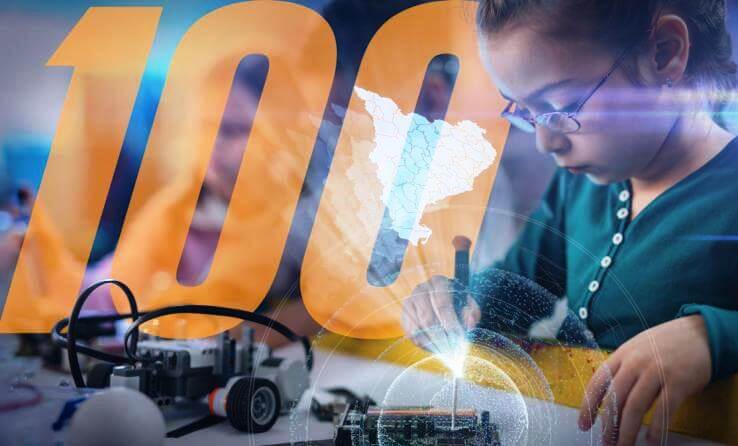
The Barcelona Science Park participates in the first “City and Science Biennial”
The Barcelona Science Park is to participate in the 1st edition of the “City and Science Biennial”—organised by the Barcelona City Council, via the Culture Institute of Barcelona (ICUB) –with the aim of improving the dissemination of scientific knowledge generated in the city, and creating closer ties with society. The programme, which comprises the participation of 118 entities and the collaboration of academics, researchers, teachers and scientists, includes around 90 activities that will take place between 7 and 11 February in over 72 locations across the city’s ten districts.
The City and Science Biennial offers a large forum for reflection, debate and participation with regards to scientific research, in order to bring the advancements and challenges faced in the fields of physics, genetics and biotechnology closer to the whole population. Its objectives are to reflect, participate, connect, reinforce equality, transfer knowledge, increase inter-disciplinary cooperation and to supplement the Science Plan of the Barcelona City Council.
To meet these objectives, a seven-strong committee—including Núria Montserrat, ICREA research professor and group leader at the Bioengineering Institute of Catalonia (IBEC)–has devised a comprehensive programme of activities with highly diverse formats, including conferences, debates, discussion sessions, open days, “hackathons”, performance arts, music, cinema and workshops, etc. This extensive offering aims to encourage scientific vocations while providing for equality of opportunities. It also seeks to promote reflection, through which the public will be able to find the answers to many of their questions, understand scientific processes and become actively involved in research.
STEAM outside the classroom
The STEAM outside the classroom “hackathon” will be hosted by the Barcelona Science Park on Thursday 7 February 2019, from 9 a.m. to 2 p.m. The event is being organised by the Fundació Alícia and will also feature the collaboration of the IBEC, Barcelona Activa, the Barcelona Education Consortium and the Barcelona Institute of Science and Technology (BIST).
The work conference will feature the participation of 100 students, who will work together to solve different challenges in the fields of food and healthy living faced by the city of Barcelona, with a particular focus on pulses. To end the activity, participants will have the opportunity to attend a guided tour of the IBEC facilities.
“100tífiques” meet-up
Also taking place at the Barcelona Science Park on Thursday 7 February 2019 will be a training day, held from 2.00 p.m. to 5.45 p.m., which will mark the launch of the “100tífiques” programme, being promoted by the Catalan Foundation for Research and Innovation, the Department of Education of the Regional Government of Catalonia and the Barcelona Education Consortium, in addition to the collaboration of BIST and STEMcat.
The meet-up will bring together over 100 women from a scientific or technological background, who will participate in a debate about their position as role models in encouraging other females to begin careers in scientific fields. There will be a networking event and a discussion on “Teaching Science: how to transmit science in schools”.
Subsequently, on 11 February, as part of the International Day of Women and Girls in Science, these scientists will share their experiences in their career in science or technology with students from 100 schools in Catalonia.
Talk by Nobel Prize-winner Ada Yonath
On Monday 11 February 2019, the PCB’s Dolores Aleu Room will host a speech by Ada E. Yonath from 1.00 p.m. to 2.00 p.m. Yonath, together with Venkatraman Ramakrishnan and Thomas A. Steitz, received the Nobel Prize for Chemistry in 2009 for her research into the structure and function of the ribosome. This award was recognition for decades of pioneering research into the application of crystallography in the study of biosynthesis methods of proteins in ribosomes.
Her conference, which will be given in English, will give us a better insight into her cutting-edge research work and the challenges currently faced by ribosome research. Inside the cells, ribosomes translate genetic information into tens of thousands of proteins, each of which plays a specific role in the body. An understanding of its structure and function could help biochemists develop new antibiotics that can change bacterial ribosomes and combat their resistance to drugs.
► More information on the “City and Science Biennial” can be found here [+]




